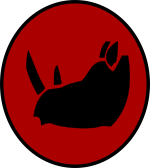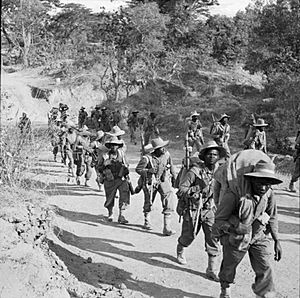11th (East Africa) Division facts for kids
Quick facts for kids 11th (East Africa) Division |
|
|---|---|

Formation sign of the 11th (East Africa) Division (second pattern)
|
|
| Active | 1943–1945 |
| Country | |
| Branch | |
| Type | Infantry |
| Size | Division |
| Part of | Fourteenth Army |
| Engagements | Second World War |
The 11th (East Africa) Infantry Division was a special military group from the British Empire. It was created in February 1943 during World War II. This division was made up of soldiers from different parts of East Africa.
Contents
Forming the East Africa Division
In 1943, the 11th (East Africa) Division was put together. Most of its soldiers came from areas known as British East Africa. It's important not to mix this group up with an earlier one. That earlier group was also called the 11th (African) Division. It had soldiers from both East and West Africa. That first group fought in the East African Campaign and was later disbanded in 1941.
Fighting in World War II
The 11th (East Africa) Division had soldiers from many places. These included Kenya, Uganda, Nyasaland, Tanganyika, Southern Rhodesia, Northern Rhodesia, and even the Belgian Congo. This division fought alongside the Fourteenth Army in Burma. This was part of the larger Burma Campaign during World War II.
In late 1944, the division chased Japanese forces. The Japanese were retreating from the Battle of Imphal. The East African soldiers followed them through the Kabaw valley. They also set up important crossing points over the Chindwin River. In 1945, parts of the division helped in the big Battle of Meiktila and Mandalay.
Leaders of the Division
The 11th (East Africa) Division had several important commanders. These leaders guided the division through its missions.
- Major-General Charles Christopher Fowkes (February 1943 – December 1944)
- Major-General Robert Mansergh (January 1945 – February 1945)
- Major-General William Dimoline (March 1945 – August 1945)
How the Division Was Organized
The 11th (East Africa) Division was made up of several smaller groups. These groups worked together to form a strong fighting force.
Infantry Brigades
The main fighting units were the infantry brigades. These were groups of soldiers who fought on foot.
- 21st East African Brigade: This brigade included soldiers from Nyasaland, Uganda, Nigeria, and Northern Rhodesia.
- 25th East African Brigade: This group had soldiers from Kenya, Tanganyika, Uganda, and Rhodesia.
- 26th East African Brigade: Soldiers from Nyasaland, Tanganyika, Uganda, and Rhodesia were part of this brigade.
Other Divisional Units
Besides the main brigades, the division also had special units for different tasks.
- Reconnaissance Unit: This unit was like the division's eyes, scouting ahead.
- Headquarters Defence Unit: This group protected the division's main command center.
- Casualty Clearing Station: This was a medical unit from the Belgian Congo that helped wounded soldiers.
Artillery and Engineers
The division also had units that provided support in battles.
- Divisional Artillery: These units used large guns to support the infantry. They were called the 302nd, 303rd, and 304th East African Field Regiments.
- Divisional Engineers: These soldiers built bridges, cleared paths, and helped with construction tasks.
Signals Unit
- 11th East African Divisional Signals: This unit was in charge of all communications. They made sure messages got to the right people quickly.
See also
- List of British Empire divisions in the Second World War
- Battle of Meiktila and Mandalay
- 1st SA Infantry Division
 | Aurelia Browder |
 | Nannie Helen Burroughs |
 | Michelle Alexander |


